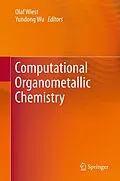Computational methods have become an indispensible tool for elucidating the mechanism of organometallic reactions. This snapshot of state-of-the-art computational studies provides an overview of the vast field of computational organometallic chemistry. Authors from Asia, Europe and the US have been selected to contribute a chapter on their specialist areas. Topics addressed include: DFT studies on zirconium-mediated reactions, force field methods in organometallic chemistry, hydrogenation of p-systems, oxidative functionalization of unactivated C-H bonds and olefins, the osmylation reaction, and cobalt carbonyl clusters. The breadth and depth of the contributions demonstrate not only the crucial role that computational methods play in the study of a wide range of organometallic reactions, but also attest the robust health of the field, which continues to benefit from, as well as inspire novel experimental studies.
Inhalt
DFT Studies on Zirconium-Mediated Reactions.- Computational Organometallic Chemistry with Force Fields.- New insights onto the molecular mechanism of H2 activation.- Transition Metal-Catalyzed Hydrogenations.- Mechanistic insights into selective oxidation of light alkanes by transition metal compounds/complexes.- Computational Studies on Osmium Catalyzed Olefin Oxidation Reactions.- Reactivity of Metal Carbene Clusters PtnCH2+ and PtMCH2+ (M=Cu, Ag, Au, Pt, Rh) toward O2 and NH3: A Computational Study.- Cobalt Catalyzed Hydroformylation and Cobalt Carbonyl Clusters: Recent Computational Studies.
